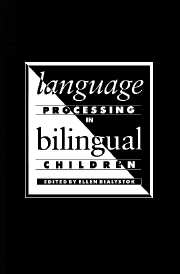Book contents
- Frontmatter
- Contents
- List of figures
- List of tables
- List of contributors
- Preface
- Introduction
- 1 Language modules and bilingual processing
- 2 Phonological processing in two languages
- 3 Second-language learning in children: a model of language learning in social context
- 4 Interdependence of first- and second-language proficiency in bilingual children
- 5 Giving formal definitions: a linguistic or metalinguistic skill?
- 6 Metalinguistic dimensions of bilingual language proficiency
- 7 Translation skill and metalinguistic awareness in bilinguals
- 8 Towards an explanatory model of the interaction between bilingualism and cognitive development
- 9 Constructive processes in bilingualism and their cognitive growth effects
- 10 Language, cognition, and education of bilingual children
- Index
1 - Language modules and bilingual processing
Published online by Cambridge University Press: 11 January 2010
- Frontmatter
- Contents
- List of figures
- List of tables
- List of contributors
- Preface
- Introduction
- 1 Language modules and bilingual processing
- 2 Phonological processing in two languages
- 3 Second-language learning in children: a model of language learning in social context
- 4 Interdependence of first- and second-language proficiency in bilingual children
- 5 Giving formal definitions: a linguistic or metalinguistic skill?
- 6 Metalinguistic dimensions of bilingual language proficiency
- 7 Translation skill and metalinguistic awareness in bilinguals
- 8 Towards an explanatory model of the interaction between bilingualism and cognitive development
- 9 Constructive processes in bilingualism and their cognitive growth effects
- 10 Language, cognition, and education of bilingual children
- Index
Summary
This chapter deals with the potential contribution of recent linguistic and psycholinguistic research to our understanding of the ways in which bilinguals (and multilinguals) process language data. The term “processing” takes on two meanings here, a developmental meaning and an on-line use meaning. Firstly, in the building up of knowledge representations (development), learners' acquisitional mechanisms need to process relevant linguistic information coming in from the environment. This is developmental processing. However, once knowledge representations become available to learners as users of their knowledge then those knowledge representations in turn need to be processed for the various uses to which learner/users want to put their language system at given moments in time. This on-line control may be called knowledge processing.
In considering various aspects of developmental processing and knowledge processing in bilinguals, extrapolations will be made from some current views on how language is represented in the mind of the learner/user and reference will be made to theoretical notions from sister disciplines which have not, at least not until very recently, been developed and demonstrated in a second language context. The theoretical status of various different kinds of linguistic knowledge will be considered, ranging from the more implicit knowledge inherent in the Chomskyan notion of linguistic competence through pragmatic knowledge, to characteristically explicit knowledge about language that is freely accessible to introspection, namely meta-knowledge.
Information
- Type
- Chapter
- Information
- Language Processing in Bilingual Children , pp. 10 - 24Publisher: Cambridge University PressPrint publication year: 1991
Accessibility standard: Unknown
Why this information is here
This section outlines the accessibility features of this content - including support for screen readers, full keyboard navigation and high-contrast display options. This may not be relevant for you.Accessibility Information
- 6
- Cited by
